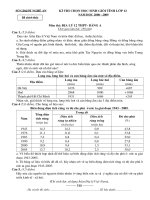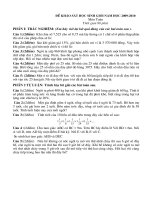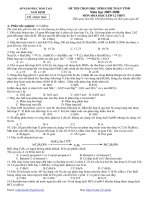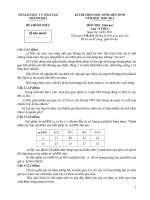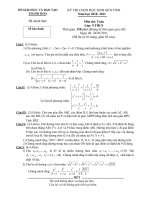- Trang chủ >>
- Đề thi >>
- Đề thi lớp 9
Đề thi học sinh giỏi tỉnh năm 2009 THCS đề số (4)
Bạn đang xem bản rút gọn của tài liệu. Xem và tải ngay bản đầy đủ của tài liệu tại đây (236.99 KB, 6 trang )
Sở giáo dục-đào tạo
hà nam
kỳ thi chọn học sinh giỏi lớp 9 thcs
năm học 2008-2009
Môn thi: tiếng anh
Thời gian làm bài 150 phút
(Đề thi gồm 05 trang, thí sinh làm bài ngay vào bộ đề thi này)
số phách
Điểm của bài thi
Họ, tên ngời chấm thi số 1:
Bằng số:
Bằng chữ:
Họ, tên ngời chấm thi số 2:
Question I: Put the verbs in the bracket into the correct tense or form (2.5 p)
When the train (1-reach) the sixth station, Tom (2-get) off, (3-feel) relieved that
his journey was so easy. But he (4-alarm) to see that he (5-get) off at a station that he
never (6-hear) before. He (7-not know) what (8-do). He explained his difficulty to a
man who (9-stand) on the flatform. With a look of amusement on his face, the man
told Tom that he (10-travel) on a train going in the wrong direction.
Your answer:
1 2 3 4
5 6 7 8
9 10
Question II: Give the correct form of the words in capital letter at the end of each sentence. (2.5 p)
1.
The Internet has some . It's very time consuming and costly.
Limit
2.
These clothes are attractive but entirely .
practice
3.
What type of clothing is for survival at these altitudes ?
need
4.
Let me introduce you a university. I think it's really reliable.
repute
5.
We'll live a happier and life if we keep our environment clean.
health
6.
The work of the charity is funded by donations.
volunteer
7.
Do you think you have the to pass the test ?
able
8.
Our school has a lot of teachers.
qualify
9.
Your English is much better, but there's still room for .
improve
10.
Remember to turn off the light. If not, it wastes .
electric
Your answer:
1 2 3 4
5 6 7 8
9 10
Question III: Fill in the gaps with "a, an, the" or no article ( ị ). (2.5 p)
I went to (1) Germany with my parents for (2) holiday (3) couple of
years ago. And it was while we were there that I met Sonya. She was (4) Swedish
and (5) same age as me. We had (6) great time together and when (7)
holiday came to (8) end we decided we would keep in touch and she would come
to (9) South Africa at Christmas. We wrote, emailed and telephoned each other,
sometimes two or three times (10) day.
Your answer:
1 2 3 4
5 6 7 8
9 10
Question IV: Read the passage, if a line is correct, put a (
) . If a line has a mistake, underline and write the
correction in the space provided. (2.0 p)
When a policeman suspects a person in the street, for example,
he may approached him and speak to him. If the policeman
thinks that the person have done something wrong, he will
arrest him. Sometimes, the person will try to escape. The police
station is the place where suspects are question.
Sometimes, they have to attended court. In court, a suspect
approach
1
may be accused of committing a crime. For example, if he finds
guilty of stealing something, he will be charging with this. As a
punishment, the court can fine him, if the offence is not serious
or even sentence him to be several months or years in prison.
Question V: Fill in each numbered blank with the most suitable word (2.5 p)
Libraries are very important in the life of all people. We can't buy all the books
we want to read. That is (1) we take out books from libraries.
There are three libraries on our campus. There is the main (2) . There is the
science library. And also (3) is the art library. Books are (4) in the catalogue.
They are arranged (5) subject. They are arranged by title. For example, you may
know the name or the (6) of a book. You can look in the (7) catalogue. You
may want to find books on a certain (8) . You can look in the subject catalogue.
There are many (9) in the catalogue. Each card contains information. The
information is important in (10) a book and in helping you decide about the book.
Your answer:
1 2 3 4 5
6 7 8 9 10
Question VI. Read the text and decide which answer A,B,C or D best fits each numbered blank (2.0p)
Most people think of computers as very modern inventions, products of our
new technological age. But actually, the idea for a computer (1) worked out over
two centuries ago by a man (2) Charles Babbage.
Babbage was born (3) 1791 and grew up to be a brilliant mathematician. He
drew up plans for several caculating machines (4) he called "engines". But despite
the fact that he (5) building some of these, he never finished any of them. Over
the years people have argued (6) his business would ever work. Recently,
however, the science Museum in London has finished building (7) engine based
on one of Babbage's designs. (8) has taken six years to complete and more (9)
four thousand parts have been specially made. Whether it works or not, the machine
will be on show at a special exhibition in the science Museum (10) remind people
of Babbage's work.
1. A-has B-was C-had D-is
2. A- known B- recognized C- written D- called
3. A- on B- in C- by D-for
4. A-whose B- who C- these D- which
5. A-wanted B- made C- started D- missed
6. A-until B- whether C-while D- through
7. A- some B- the C- an D-that
8. A- One B- He C- They D-It
9. A- than B- therefore C- when D- then
10. A-to B- as C-for D- so
Your answer:
1 2 3 4 5 6 7 8 9 10
Question VII. Read the text and decide which answer A,B,C or D best fits each sentence. (1.0p)
Every year people in many countries learn English. Some of them are young
children. Others are teenagers. Many are adults. Some learn at school. Others study
by themselves. A few learn English just by hearing the language in films, on
television, in the office or among their friends. But not many are lucky enough to do
that. Most people must work hard to learn English.
Why do all these people learn English ? It's not difficult to answer this
question. Many boys and girls learn English at school because it is one of their
2
subjects. Many adults learn English because it is useful for their work. Teenagers
often learn English for their higher studies because some of their books are in English
at the college or university. Other people learn English because they want to read
newspapers or magazines in English.
1/ According to the writer,
A. only young people learn English
B. English is useful only for university students
C. all people learn English at school
D. English is popular all over the world
2/ Most people learn English by
A. watching films
B. hearing the language on television
C. working hard on the lessons
D. speaking English to their friends
3/ Many boys and girls learn English because
A. it is included in their study courses
B. it's useful for their higher studies
C. it's their own language
D. they are forced to learn it
4/ Many adults learn English
A. in order to be able to read newspapers in English
B. because it helps them in their work
C. because of their higher studies
D. to communicate with their colleagues in the office
5/ Which of the following isn't mentioned ?
A. English is widely used
B. English is a compulsory subject
C. English is spoken in the office
D. English is the language of diplomacy
Question VIII. Rewrite each sentence, beginning as shown, so that the meaning stays the same. (2.5p)
1/ It's very difficult to do that exercise.
I find
2/ "Why didn't Mary phone me yesterday ?"
Her brother asked
3/ It rained so heavily that they decided to cancel the match.
So heavily
4/ You press this button to stop the machine.
If you
5/ The teenagers aren't buying that model these days.
That model
6/ He didn't study hard, so he failed his exam.
If he
7/ Could I borrow your surfboard ?
Would you ?
8/ My parents didn't let me stay out late when I was younger.
I wasn't
9/ I had expected the weather to be worse.
The weather wasn't
10/ The road is so narrow that it's difficult for two cars to pass each other.
It is
3
Question IX: Make all the changes and additions to produce, from the following sets of words and phrases,
sentences which together make a complete letter. (2.5 p)
Dear Paul,
1-Thank you / much / letter / arrive / few days ago/./
2-It / lovely / hear / you /./
3- I / sorry / I / not write / such / long time / but / I / very / busy /./
4- As / you / know / we / buy / new house / september /./
5-It / be / very bad condition / and / it / need / lot / work /./
6-We / finish / most / it / now / and / look / very nice /./
7-Peter / I / decide / give / house-warming party / May 3rd /./
8-You / think / you / able / come /?/
9-Please / give / ring / let / know / you / can / make / it /./
10- I / really / look forward / see / you / again /./
The End
4
Sở giáo dục-đào tạo
hà nam
hớng dẫn chấm
bài thi chọn học sinh giỏi lớp 9
năm học 2008-2009
Question I: Put the verbs in the bracket into the correct tense or form (2.5 p)
10 x 0.25= 2.5
1. reached 2. got 3. feeling 4. was alarmed 5. had got
6. had never heard 7. didn't know 8. to do 9. was standing 10.had travelled
Question II: Give the correct form of the words in capital letter at the end of each sentence. (2.5 p)
10 x 0.25= 2.5
1. limitations 2. unpractical 3. necessary 4. reputable 5. healthier
6. voluntary 7. ability 8. qualified 9. improvement 10. electricity
Question III: Fill in the gaps with "a, an, the" or no article ( ị ). ( (2.5 p)
10 x 0.25= 2.5
1. ( ị )
2. a 3. a
4. ( ị )
5. the
6. a 7. the 8. an
9. ( ị )
10. a
Question IV: Find and underline the mistakes, then write the correction on the spaces provided at the end of
each line. If a line is correct, put a (
) (2.0 p)
8 x 0.25= 2.0
When a policeman suspects a person in the street, for example,
he may approach to him and speaks to him. If the policeman
thinks that the person has been done something wrong, he will
arrest him. Sometimes, the person will try to escape. The police
station is the place where suspects are question.
Sometimes, they have to attended court. In court, a suspect
may be accused of committing a crime. For example, if he finds
guilty of stealing something, he will be charging with this. As a
punishment, the court can fine him, if the offence is not serious
or even sentence him to be several months or years in prison.
has done
are questioned
attend
is found
charged
to several
Question V: Fill in each numbered blank with a correct word. (2.5 p)
10 x 0.25= 2.5
1-why 2-library 3. there 4. arranged 5-by
6-author 7-title 8-subject 9-cards 10-finding
Question VI. Read the text and decide which answer A,B,C or D best fits each numbered blank (2.0p)
10 x 0.2 = 2.0
1 2 3 4 5 6 7 8 9 10
b D B D C B C D A a
Question VII. Read the text and decide which answer A,B,C or D best fits each sentence. (1.0p)
5 x 0.2 = 1.0
1 2 3 4 5
D C A B D
Question VIII. Rewrite each sentence, beginning as shown, so that the meaning stays the same. (2.5p)
10 x 0.25= 2.5
1- I find it difficult to do that exercise.
5
2- Her brother asked her why Mary hadn't phoned him the day before/(the previous
day).
3- So heavily did it rain that they decided to cancel the match.
4- If you press this button, the machine will stop.
5-That model isn't being bought these days by the teenagers/ (by the teenagers these
days).
6-If he had studied hard, he wouldn't have failed his exam/ he would have passed his
exam.
7-Would you mind lending me your surfboard ?
8-I wasn't allowed to stay out late (by my parents) when I was younger.
9-The weather wasn't as bad as I had expected.
10-It is such a narrow road that it's difficult for two cars to pass each other.
Question IX: Make all the changes and additions to produce, from the following sets of words and
phrases, sentences which together make a complete letter. (2.5 p) (10 x 0,25= 2,5 p)
Dear Paul,
1/ Thank you very much for your letter which arrived few days ago/( arriving few
days ago).
2/ It was/ (is) lovely to hear from you.
3/ I am sorry I haven't written for such a long time, but I have been very busy.
4/ As you know, we bought a new house in September.
5/ It was in very bad condition and it needed a lot of work.
6/ We have finished most of it now and it looks very nice.
7/ Peter and I (have) decided to give a house-warming party on May 3rd.
8/ Do you think you will be able to come ?
9/ Please give me a ring and let me know if you can make it.
10/ I am really looking/ really look forward to seeing you again.
ThÝ sinh cã thÓ viÕt theo c¸ch kh¸c nhng ph¶i sö dông hÕt c¸c gîi ý; C©u ®óng ng÷ ph¸p ,
cã nghÜa phï hîp víi ng÷ c¶nh vÉn cho ®iÓm.
ThThÝ
The End
6
